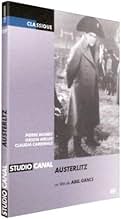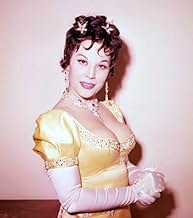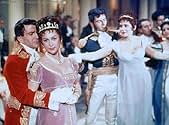Austerlitz
- 1960
- Tous publics
- 2h 46m
IMDb RATING
6.2/10
1.1K
YOUR RATING
Another of Napoleon's adventures in this epic reconstruction of the battle of Austerlitz, where he had the greatest victory of his career, over the Russians.Another of Napoleon's adventures in this epic reconstruction of the battle of Austerlitz, where he had the greatest victory of his career, over the Russians.Another of Napoleon's adventures in this epic reconstruction of the battle of Austerlitz, where he had the greatest victory of his career, over the Russians.
- Director
- Writers
- Stars
- Awards
- 1 nomination total
- Director
- Writers
- All cast & crew
- Production, box office & more at IMDbPro
Featured reviews
Austerlitz (1960) was the battle that made Napoleon Bonaparte not only one of western civilization's greatest generals, but it solidify his position as Napoleon I "The Emperor of France". I saw this film many years ago on video. The colors were washed out and it was cropped big time. Besides these faults, the movie was great. If there's a movie that needs to be restored it's this one. A film of this magnitude and the grand scale it was presented on needs to be shown it is original glory.
NAPOLEON was restored recently. It's only fitting that the film that the same director spent his entire life on have one of it's sequels be remastered and preserved in the same way.
Highly recommended.
NAPOLEON was restored recently. It's only fitting that the film that the same director spent his entire life on have one of it's sequels be remastered and preserved in the same way.
Highly recommended.
...and to "Napoleon" whose life Gance transferred to the screen in the silent era.Sandwiched between two very underrated Gance works ("la Tour de Nesles" and "Cyrano et D'Artagnan" )it is a return to "real " "true" history.I will go as far as to write that Gance impressed me much more when his movies dealt with fictionalized history (the two mentioned movies,but "j'accuse" too)."Austerlitz has something academic ,conventional.It has nothing of Gance's madness.The first part is a stream of stars from Martine Carol to Claudia Cardinale ,from Jean Marais to Orson Welles (in a part which reminds us how Gance was interested in the development of science through the centuries ,à la Jules Verne,we find this interest in "Cyrano" and "J'accuse" too).THe lead is a good actor but he might be ,on an international level, the least known of them all:Pierre Mondy's name is buried in the cast and credits and although he is on the screen from the beginning to the end,his name is not bigger than that of Welles who appears barely five minutes.Ah fame! The first part has only one sequence where we find back the inventive Gance:we do not attend the coronation in Notre Dame ;the marechal de Ségur (Jean-Louis Trintignant) tells the whole story with the model in front of a strange audience:servants ;then the "mamma " ("pourvu que ça dure!=lets hope it lasts!") ,Napoleon's mother (Elvire Popesco) enters and her tears begin to flow .Although David put her in his famous painting she did not attend the ceremony.
The second part is more historically interesting ,but if you are not fond of military strategy ,you may stop yourself yawning.Fortunately a soldier of the old guard of Napoléon (un "grognard" )played by Michel Simon brings a bit of life among these troop movements.
Last but not least:I have always asked myself why a convinced pacifist such as Gance (his two versions of "j'accuse" may be the strongest anti-war films ever)could be so fascinated by a warrior such as Napoleon.
The second part is more historically interesting ,but if you are not fond of military strategy ,you may stop yourself yawning.Fortunately a soldier of the old guard of Napoléon (un "grognard" )played by Michel Simon brings a bit of life among these troop movements.
Last but not least:I have always asked myself why a convinced pacifist such as Gance (his two versions of "j'accuse" may be the strongest anti-war films ever)could be so fascinated by a warrior such as Napoleon.
This movie is a huge disappointment. You'd expect the battle of Austerlitz to be the core subject as the title suggests, but it's not. Most of the movie is about the Napoleonic era before the battle, with a pseudo historic perspective. If you know just a little about history, you'll find yourself yawning most of the time, as Abel Gance tries to describe the situation for hours, through endless dialogs. Then when Napoleon is about to be crowned, you think: oh no, not another half hour just for that scene. Fortunately there's no coronation scene, but.. worse: it's told! You guess correctly: Gance didn't have the budget to do it. He might as well just skipped the whole episode.
By then you've waited more than 2 hours and still no battle in sight. At last the battle comes but what you see is a tragic waste. The tactics and whereabouts of the battle are not shown but told, and you can hardly understand what's going on. A cavalry charges from right to left (a couple hundred horses), and you assume it's the Austrian cavalry. Then you're told that they're defeated by the French, and you see the same guys charging from left to right (they don't even seem to have switched costumes). Parts of the battle were filmed in studio, with ridiculous painted backgrounds. The close combat scenes are unrealistic at best. Soldiers fall apparently for no reason, and if nobody told you about the outcome, you wouldn't know who won or lost. The last scene with the French Army singing the national anthem completes the cinematographic disaster.
All in all, you sit back with the feeling that this movie was conceived and shot in the early days of movie making, not in 1960: it's not a movie about Austerlitz, it's the pathetic attempt of an aging man trying to describe the glory of an emperor he admired. The result is a boring picture that doesn't even enhance our historic understanding of the Napoleon era (in spite of Gance's attempts to stick to some historic details).
By then you've waited more than 2 hours and still no battle in sight. At last the battle comes but what you see is a tragic waste. The tactics and whereabouts of the battle are not shown but told, and you can hardly understand what's going on. A cavalry charges from right to left (a couple hundred horses), and you assume it's the Austrian cavalry. Then you're told that they're defeated by the French, and you see the same guys charging from left to right (they don't even seem to have switched costumes). Parts of the battle were filmed in studio, with ridiculous painted backgrounds. The close combat scenes are unrealistic at best. Soldiers fall apparently for no reason, and if nobody told you about the outcome, you wouldn't know who won or lost. The last scene with the French Army singing the national anthem completes the cinematographic disaster.
All in all, you sit back with the feeling that this movie was conceived and shot in the early days of movie making, not in 1960: it's not a movie about Austerlitz, it's the pathetic attempt of an aging man trying to describe the glory of an emperor he admired. The result is a boring picture that doesn't even enhance our historic understanding of the Napoleon era (in spite of Gance's attempts to stick to some historic details).
My review of this film can be summed up in five words a brilliant work of art.As described in the previous description the film itself is long and sometimes tedious.What it fails to mention is that it was created by the same Director that brought us the Silent film about Napoleon Abel Gance.The film is in colour and is very faithful to the feel of Napoleon and the time he ruled Europe.It is primarily about the greatest victory Napoleon achieved in his career,however it also touches on many of the events in his life leading up to that moment including his coronation as Emperor of France.If you are a student of Napoleon or French history or this time period you will enjoy this picture.Shot all throughout Europe in the fifties in many languages it remains in my opinion as the greatest picture chronicling Napoleon and his life.The film not only tells a story from his perspective but many others as well.It is difficult to find and even more expensive to own but I definitely recommend you see it at least once for yourself.
This movie exemplifies the debt that French cinema owes to theater. And, it shows how it can crumble under it.
One cannot say that this movie is badly made, lazy or uninspired. Yet, I did not feel the grandeur of this historic episode as I think it was intended. The movie is not boring or flat. However, for a film that covers the most brilliant victory of a legendary general, it feels a bit toothless.
The film spends the first half carefully laying out the situation and issues that led Napoleon to crown himself emperor. I would say that it is rather static, and feels like a play. It is dialog-heavy. I am not sure why Mondy was chosen as Napoleon. He looks convincing in most of it, yet he does a lot of yelling, which does not give off a statesman-like quality. It does not really capture the heft of it. The film is also heavy on intrigue and personal drama, it can feel tedious if you're not into French history. Some important events happen off-screen; it is harder to keep being engaged with what is happening.
My favorite scene happens as an act-break of sorts, roughly at the middle, it is Napoleons coronation. It is off-screen as well, but it is represented in form of house staff following the ceremony in parallel; at the palace not the church, with the help of rehearsal miniatures. That is where Gances talent shines. It is the best stuff in the movie and it is very clever and inventive. I suspect that it was done this way because filming the actual re-enactment of the ceremony would have been too expensive/difficult. Yet, it totally works. It treats an event that is big, extravagant, symbolic in something more intimate. The scene encapsulates something more classical. Because it focuses not on Napoleon, the pope or the dignitaries, but on the house staff reactions, you get something sweetly human. It is the reaction of the common folk, the little people. One of his aides provides a voice-over that turns the scene into something very poetic, almost Communion-like. It makes it very solemn and dignified. The immobile lifeless miniatures tie the scene in a very iconic, clean, divine bow.
Generally, you get that this film serves as an update to Gances own Napoleon. In that sense, it would serve as an example that less is more. The previous film was regarded, and still is, as one of the most inventive and important of the silent era. Here, you can feel that with the use of sound, dialog, color and the ability to film battles and impressive set-pieces; you are losing the essence of Napoleon: the persona. The strength of the film Napoleon was the visuals and the sense of distant majestic dignity it conveyed. In Austerlitz, despite sound and color, you lose the striking visual poetry. You are left with more precise plot points, but less evocative characters.
One cannot say that this movie is badly made, lazy or uninspired. Yet, I did not feel the grandeur of this historic episode as I think it was intended. The movie is not boring or flat. However, for a film that covers the most brilliant victory of a legendary general, it feels a bit toothless.
The film spends the first half carefully laying out the situation and issues that led Napoleon to crown himself emperor. I would say that it is rather static, and feels like a play. It is dialog-heavy. I am not sure why Mondy was chosen as Napoleon. He looks convincing in most of it, yet he does a lot of yelling, which does not give off a statesman-like quality. It does not really capture the heft of it. The film is also heavy on intrigue and personal drama, it can feel tedious if you're not into French history. Some important events happen off-screen; it is harder to keep being engaged with what is happening.
My favorite scene happens as an act-break of sorts, roughly at the middle, it is Napoleons coronation. It is off-screen as well, but it is represented in form of house staff following the ceremony in parallel; at the palace not the church, with the help of rehearsal miniatures. That is where Gances talent shines. It is the best stuff in the movie and it is very clever and inventive. I suspect that it was done this way because filming the actual re-enactment of the ceremony would have been too expensive/difficult. Yet, it totally works. It treats an event that is big, extravagant, symbolic in something more intimate. The scene encapsulates something more classical. Because it focuses not on Napoleon, the pope or the dignitaries, but on the house staff reactions, you get something sweetly human. It is the reaction of the common folk, the little people. One of his aides provides a voice-over that turns the scene into something very poetic, almost Communion-like. It makes it very solemn and dignified. The immobile lifeless miniatures tie the scene in a very iconic, clean, divine bow.
Generally, you get that this film serves as an update to Gances own Napoleon. In that sense, it would serve as an example that less is more. The previous film was regarded, and still is, as one of the most inventive and important of the silent era. Here, you can feel that with the use of sound, dialog, color and the ability to film battles and impressive set-pieces; you are losing the essence of Napoleon: the persona. The strength of the film Napoleon was the visuals and the sense of distant majestic dignity it conveyed. In Austerlitz, despite sound and color, you lose the striking visual poetry. You are left with more precise plot points, but less evocative characters.
Did you know
- TriviaIn the 1920s Abel Gance had written a six-part movie biography of Napoleon. He shot the first part (Napoléon (1927)), which turned out to be a financial disaster. He sold the sixth part to Lupu Pick, who shot Sainte-Hélène (1929). Wanting to make a comeback at the end of the 1950s, Gance rewrote the third part to make it "Austerlitz".
- GoofsIn the scene in William Pitt's office in London which is set in the early 1800's, you can see in the background through the window the Houses of Parliament and Big Ben, 60 years before they were built.
- Alternate versionsThe original French version runs longer than the English dubbed international one. It contains extra scenes including ones with Napoleon visiting his mistress and of Ségur (Jean-Louis Trintignant) imagining the coronation of the emperor for the palace staff.
- ConnectionsEdited into Histoire(s) du cinéma: Seul le cinéma (1994)
- How long is The Battle of Austerlitz?Powered by Alexa
Details
- Release date
- Countries of origin
- Language
- Also known as
- The Battle of Austerlitz
- Filming locations
- Production companies
- See more company credits at IMDbPro
Box office
- Budget
- $4,000,000 (estimated)
- Runtime
- 2h 46m(166 min)
- Sound mix
- Aspect ratio
- 2.35 : 1
Contribute to this page
Suggest an edit or add missing content






































